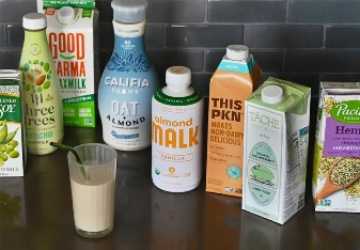The ascension of plant-based milk alternatives has observed a prodigious augmentation over the past decade. With a burgeoning cognizance of health, environmental sustainability, and animal welfare, a proliferating number of individuals are gravitating towards these alternatives. But what precisely is catalyzing this trend? Let's delve into the constituents contributing to the burgeoning proclivity for plant-based milk trends, popular dairy-free milk, and strategies for choosing plant milk.
Health Benefits of Plant-Based Milk
Nutritional Supremacy
Plant-based milk alternatives frequently furnish unique nutritional boons compared to traditional dairy milk. Some notable advantages include:
- Abstemious in calories and adipose content: Numerous popular dairy-free milk, such as almond milk and coconut milk, encompass fewer calories and fat than bovine milk.
- Rich in micronutrients: Fortified plant milk supplies indispensable nutrients such as vitamin D, calcium, and vitamin B12.
- Replete with antioxidants: Soy milk and almond milk are acclaimed for their copious antioxidant content, which aids in mitigating oxidative stress.

Lactose Intolerance and Allergies
A substantial segment of the populace is afflicted with lactose intolerance or dairy allergies. For these individuals, choosing plant milk becomes imperative. Plant-based alternatives are inherently lactose-free and appropriate for those with dairy allergies. This has precipitated the plant-based milk trends among health-conscious consumers.
Environmental Impact
Diminished Carbon Footprint
The environmental prerogatives of choosing plant milk are considerable. The production of plant-based milk necessitates significantly less water and engenders fewer greenhouse gases compared to dairy milk production:
- Lower aqueous consumption: The production of almond milk utilizes less water than dairy farming.
- Mitigated greenhouse gas emissions: Oat milk and soy milk possess a diminished carbon footprint compared to bovine milk.
Sustainable Agrarian Practices
Many purveyors of popular dairy-free milk adopt sustainable agricultural practices. For instance, oat and hemp milk production frequently involves crop rotation and organic farming, contributing to soil vitality and biodiversity.
Ethical Considerations
Animal Welfare
Concerns regarding animal welfare are a principal impetus behind the plant-based milk trends. The dairy industry has encountered scrutiny over animal treatment practices, prompting consumers to seek cruelty-free alternatives. Plant-based milk offer an ethical option that aligns with the values of those concerned about animal rights.
Vegan and Vegetarian Lifestyles
The ascendancy of veganism and vegetarianism has also augmented the demand for popular dairy-free milk. Plant-based diets eschew animal products, making plant milk a fundamental component for many vegans and vegetarians. This shift is reflected in the expanding variety of popular dairy-free milk available in the marketplace.
Variety and Flavor
Diverse Options
One of the captivating aspects of choosing plant milk is the wide array of options available. Some common selections include:
- Almond milk: Esteemed for its mild flavor and versatility in culinary applications.
- Soy milk: A protein-abundant option that closely emulates bovine milk in texture.
- Coconut milk: Offers a rich, creamy texture ideal for cooking and baking.
- Oat milk: Renowned for its creamy consistency and mild, sweet taste.
- Rice milk: A hypoallergenic option suitable for those with nut or soy allergies.
Culinary Applications
Plant-based milk are not solely for drinking. They are also utilized extensively in cooking and baking. Recipes often call for popular dairy-free milk to augment the flavor and texture of dishes without the necessity for dairy. This versatility is another reason why plant-based milk trends are proliferating.
Marketing and Accessibility
Augmented Availability
The accessibility of popular dairy-free milk has been enhanced considerably. Supermarkets and health food stores now stock an extensive range of plant milk, simplifying the process for consumers to locate and purchase them. This increased availability has played a pivotal role in the proliferation of plant-based milk trends.
Marketing Endeavors
Marketing efforts have also contributed significantly. Brands accentuate the health benefits, environmental impact, and ethical considerations of choosing plant milk. These campaigns resonate with consumers seeking healthier and more sustainable options, further driving the popularity of plant-based milk.
Economic Factors
Cost Parity
The cost of popular dairy-free milk has become more competitive. As demand surges and production scales up, prices have become more affordable. Consumers are now more inclined to consider choosing plant milk as a cost-effective alternative to dairy.
Supporting Local Economies
Some plant-based milk brands focus on bolstering local economies by sourcing ingredients from local farmers. This not only ensures the freshness of the product but also promotes economic sustainability within communities.
Future Trends
Innovation and Novel Products
The plant-based milk trends show no signs of abating. Innovation continues to propel the market, with new products and flavors being introduced regularly. Companies are experimenting with ingredients such as pea protein and hemp to create novel popular dairy-free milk.

Consumer Education
As consumers become more enlightened about the benefits of choosing plant milk, the demand is expected to burgeon. Information about the health, environmental, and ethical advantages of plant-based milk is more accessible than ever, encouraging more people to make the switch.
Technological Advancements
Enhanced Production Methods
Technological innovations are revolutionizing the production of popular dairy-free milk. Significant advancements include:
- Precision fermentation techniques: This technology facilitates the production of dairy-identical proteins sans the utilization of animals.
- Biotechnological advancements: Genetic engineering and biotechnology are employed to enhance the nutritional profile and palatability of plant-based milk.
- Automated processing systems: Automation in production processes augments efficiency and ensures consistency in quality.
Sustainable Packaging Solutions
The ascent of plant-based milk trends is also driven by advancements in packaging technology. Innovations include:
- Eco-friendly packaging materials: Brands are adopting biodegradable and recyclable packaging materials to mitigate environmental impact.
- Smart packaging solutions: Innovative packaging extends shelf life and enhances product safety.
- Minimalist design aesthetics: Simple, minimalist packaging designs resonate with eco-conscious consumers.
Health and Wellness Industry Integration
Functional Ingredients
The incorporation of functional ingredients into popular dairy-free milk is augmenting their appeal. Key ingredients include:
- Probiotics and prebiotics: Integrated to bolster gut health and digestion.
- Adaptogens: Herbal compounds that aid the body in adapting to stress.
- Superfoods: Nutrient-dense ingredients such as spirulina and turmeric are incorporated to add health benefits.
Personalized Nutrition
The paradigm of personalized nutrition is gaining traction within the plant-based milk trends. Innovations include:
- Customizable formulations: Consumers can select plant milk tailored to their specific nutritional requirements and preferences.
- Genomic-based recommendations: Advanced testing and analysis provide personalized dietary recommendations, including optimal plant milk options.
Conclusion
The rise in popularity of plant-based milk alternatives is driven by a confluence of health benefits, environmental impact, ethical considerations, variety and flavor, marketing efforts, economic factors, and future trends. The plant-based milk trends epitomize a shift in consumer preferences towards healthier, more sustainable, and ethically produced products. With an expanding variety of popular dairy-free milk and increasing awareness, choosing plant milk is becoming a mainstream choice for many.
